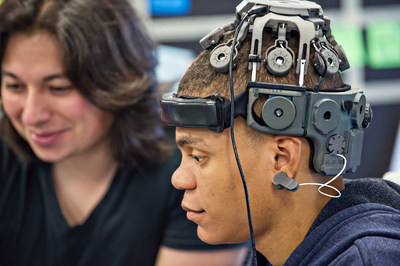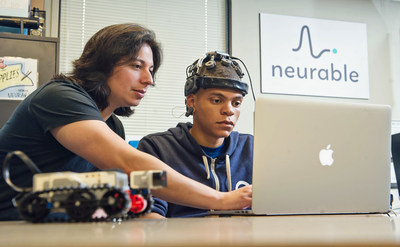CAMBRIDGE, Mass., Dec. 22, 2016 /PRNewswire/ — Neurable, a developer of brain-computer interface (BCI) technology based on breakthrough neuroscience, has raised a $2M seed round to bring its software platform to market. Brian Shinled the round through Accomplice’s Boston Syndicate with participation from Point Judith Capital, Loup Ventures, the Kraft Group, NXT Ventures, and prominent angel investors.


Neurable’s patent-pending technology interprets intent based on users’ brain activity, enabling real-time control of software and connected devices using only the power of the brain. The company is developing a Software Development Kit (SDK) for integration of its technology with virtual/augmented reality content and headsets.
“Our goal is to build a new platform for human-computer interaction,” said Ramses Alcaide, co-founder and CEO of Neurable. “Our investors share our vision for the broad potential of our technology and for creating a world without limitations. We appreciate their confidence.”
“The team at Neurable believe that they can enable people to easily control devices and objects with their minds. The implications would be enormous,” said Brian Shin, who led the Boston Syndicate investment in Neurable. “They have a chance to completely alter the way humans interact with technology which is something that I had to be a part of.”
Neurable has roots at the University of Michigan’s Direct Brain Interface Laboratory where Alcaide invented the core technology while working on his PhD under Dr. Jane Huggins, one of the foremost researchers in brain-computer interfaces. Its innovation is based on new insights into how certain brainwaves work. Neurable performs complex data analyses using novel machine learning approaches, which provide significant advantages in speed and accuracy when determining user intent. A preliminary version of Alcaide and Huggins’ work was published in the November 2014Journal of Neural Engineering.
“Neurable’s technology embodies a breakthrough in BCI function initially developed at the University of Michigan Direct Brain Interface laboratory,” said Huggins, “and introduces a new generation of BCI capabilities.”
Applying Neurable to AR/VR
Neurable offers a powerful new method for interaction in AR/VR applications, solving many of the current problems with user experience. Neurable offers a hands-free method for control while avoiding the limitations of other technologies such as eye-tracking or voice commands. With Neurable, users can control menus and options in AR displays, or create magic and cast spells in VR games, all through the power of their brains. Neurable is non-invasive and uses dry-electrode sensors to record brain activity. It is also wireless, so it does not impair users’ movement.
Neurable will license its Software Development Kit (SDK) to manufacturers of AR/VR headsets and to content developers. The SDK is platform agnostic and compatible with all leading AR/VR headsets, including Oculus Rift, HTC Vive, and the Microsoft HoloLens. The Neurable SDK includes plugin support for leading game engines such as Unity and Unreal as well as Qt, a platform for UI, application, and embedded device development.
Neurable’s SDK will be released to select developers in the second half of 2017.
About Neurable
Neurable is developing software based on breakthrough brain-computer interface (BCI) research and novel insights in neuroscience. Its patent-pending technology interprets intention based on brain activity, providing users with reliable real-time control of software and software-controlled devices using only their minds. As a platform for human-computer interaction, Neurable is targeting virtual and augmented reality, licensing its software development kit (SDK) to content developers and headset manufacturers to enable completely new and immersive experiences. For more information visit www.neurable.com.
